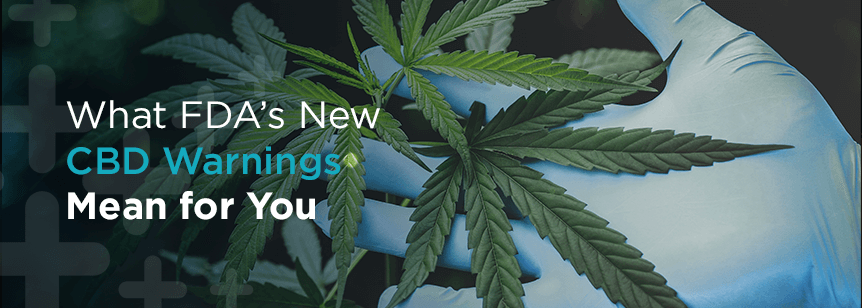
CBD, the non-psychoactive component of the cannabis-derived hemp plant, has been widely touted as a remedy for everything from anxiety, to pain, to insomnia—at least in the court of consumer buzz. Yet the U.S. Food and Drug Administration (FDA) has recently published an updated statement about CBD on its government website—and in it are some pretty strongly-worded safety warnings.
“CBD has the potential to harm you, and harm can happen even before you become aware of it,” the FDA wrote. The FDA is responsible for ensuring all the food, beverages and drugs we put into our bodies are safe and effective—so, the only FDA-approved prescription cannabis-related drug so far has been Epidiolex (recently approved for treating two very rare form of epilepsy)—and nothing else. For the general public, it seems the FDA remains more than wary about cannabidiol and its related products.
Among the FDA’s concerns are whether CBD has the potential for causing liver damage, as well as other negative side effects such as sedation, diarrhea, mood swings, and even the potential for male reproductive toxicity. The FDA also wants to know more about special populations using CBD, such as children, the elderly, and our pets. And, they’re looking to investigate the cumulative effects CBD, such as what happens when using a variety of ingestion methods such as edibles, topicals, and/or inhalation.
These warnings are not particularly surprising: the FDA has been hemming and hawing about CBD ever since congress passed the U.S. Farm Bill in 2018—dragging its feet to regulate anything having to do with this “supplement” (code for, not food or drugs, so not the FDA’s responsibility). So while not a shock, the warnings are still confusing. Considering the government still has a number of sanctioned—and even federally-funded—CBD research studies underway that could tell us more, and despite the fact that several other regulatory commissions have come out with more clear, supportive views.
Such as the National Institute on Drug Abuse (NIDA), as well as the World Health Organization (WHO). In recent years both regulatory bodies have released statements with the assessment that cannabidiol is generally well-tolerated by the public, safe for human consumption, and has promise for healing various types of medical conditions. The WHO also points to countries that have successfully modified their regulations on CBD for medical use, even in places where THC-derived marijuana is still banned or highly controlled.
But when it comes to CBD in the U.S., it’s clear that the FDA is playing it safe. Much more data is needed, they claim, before writing any more CBD legislation or regulation.
Yet, according to a report by NPR, the whole of the FDA’s warnings and advisories are based on conclusions drawn from only about 12 studies in total, with some of them dating back decades. Worse, all are based exclusively on animal studies—including one on sea urchins, and another on cells isolated entirely from their animal counterpart. So these are hardly human trials.
Another of the FDA’s problematic conclusions is about liver toxicity, drawn from reviewing the same studies looked at to approve Epidiolex. But within those studies, decreased liver function was extremely dose dependent. In one study, mice got approximately 10 times the amount of cannabidiol as the maximum recommended dose of medication and in another, the contraindication was only observed when cannabidiol was used in combination with other drugs.
So while these studies may indicate some potential for risk, it’d be prudent to take it all with a grain of salt. Should dosing remain a concern, one emergent idea from the health community would be to regulate the industry on some kind of tiered system—as in, high-dose products could be more-restricted, requiring a prescription, while low-dose products would be more widely available to the public.
Regardless of where hemp is headed, it seems likely the CBD craze will rage on, with sales expected to reach 16 billion by the year 2025. And while we know the government will eventually lay down the law on hemp, CBD, and all cannabis-related products—or at least install a bevy of new rules, regulations, taxes, and/or consumer protections—it seems for now we can only follow along in what the FDA is both learning, and fearing, about this newest wellness trend.
Sarah A Lybrand is a writer specializing in lifestyle, health, finance, cannabis—and fun. She’s written for Yahoo Finance & Shine, Bust, Juno, MarketSmiths and Toast Media, among many others.
No Information on MarijuanaDoctors.Com should be used to diagnose, treat, prevent or cure any disease or condition. You can view our Full Disclaimer here.